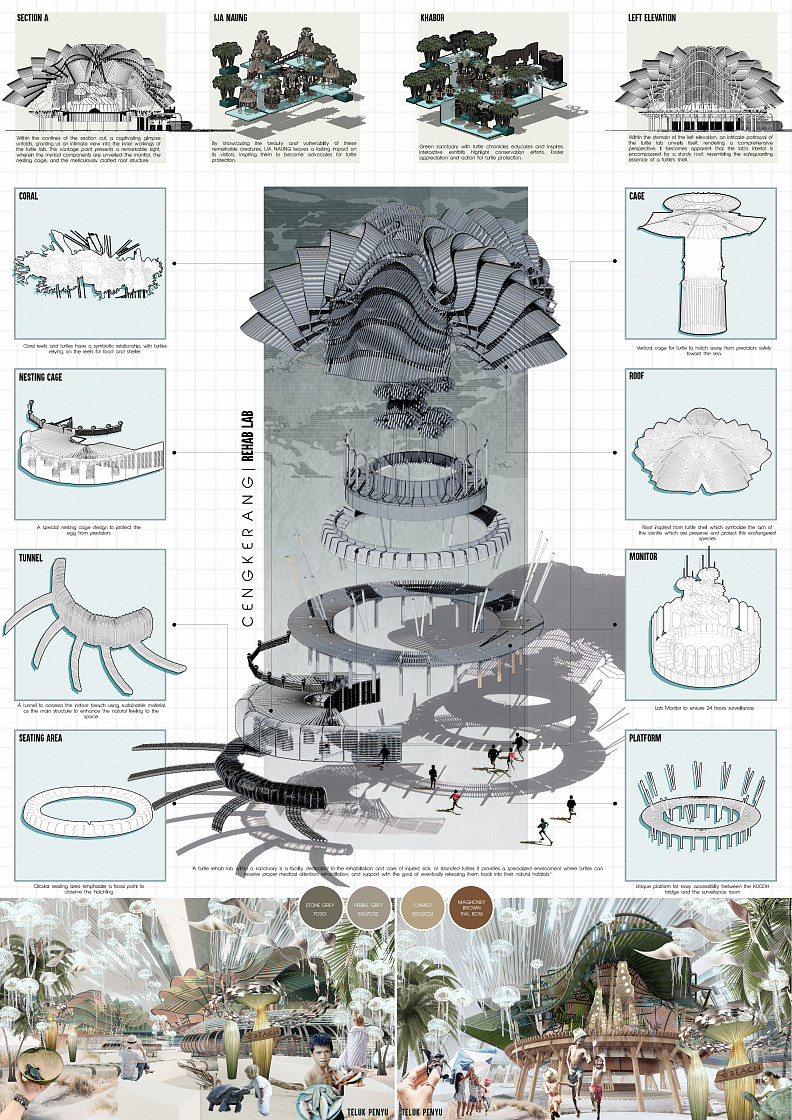PENYU : Turtle Conservation Center

Project idea
The Turtle Conservation Centre (TCC) in Kuala Terengganu, Malaysia, is a visionary project born from the urgent need to protect endangered turtle species and raise awareness about marine conservation. As turtles face mounting threats such as habitat destruction, pollution, and a lack of public knowledge, the TCC aims to serve as a sanctuary where education, rehabilitation, and sustainable tourism come together. At its core, the idea behind the TCC is to build a space that not only safeguards turtles but also fosters a meaningful connection between humans and the natural world. By highlighting the life cycle of turtles and the challenges they endure, the center aspires to spark responsibility and inspire real action, paving the way for a future where humans and marine life can coexist in harmony.
Project description
The Turtle Conservation Centre is more than just a turtle sanctuary — it’s a fully integrated facility combining rehabilitation, education, research, and eco-tourism. The design reflects a deep commitment to sustainability and environmental stewardship, creating a calming and immersive experience for visitors. Key components of the center include interactive exhibition areas where guests can learn about conservation, advanced medical facilities for the care and recovery of injured turtles, and a controlled incubator space to protect hatchlings during their most vulnerable stages. One of the unique elements of the project is its eco-conscious resort, which offers visitors a luxurious yet environmentally responsible place to stay, surrounded by nature. In addition to hosting tourists, the center serves as a collaborative hub for scientific research, working with both local and international conservation partners. TCC also plays a critical role in community development, offering job opportunities and involving locals in sustainability efforts. Through this holistic approach, the center promotes marine conservation, sustainable tourism, and public engagement, all within one thoughtful, well-designed space.
Technical information
The spatial planning and material choices for the Turtle Conservation Centre have been carefully considered to meet both functional and environmental needs. Each space within the center is designed with purpose — from the immersive exhibition zones to the specialized rehabilitation and incubation areas, all laid out to ensure logical flow and ease of use. Durable and eco-friendly materials are prioritized to withstand the harsh coastal climate while maintaining structural integrity. Teak wood is used for its natural resistance to decay and moisture, making it ideal for the humid, salt-laden air. Fiberglass is selected for windows and doors due to its non-corrosive, long-lasting qualities. For roofing, synthetic options such as composite or metal are chosen for their ability to resist saltwater damage. To further protect against harsh weather conditions, impact-resistant glass is incorporated, along with high-salt-resistant heavy-duty paint to prolong the life of exterior surfaces. These technical decisions not only support sustainability but also ensure the long-term functionality and resilience of the center. Overall, TCC’s materials and design strategies work together to provide a safe, eco-conscious, and inviting environment that aligns with its conservation mission.















